Office 365
Introduction text.
Prerequisites
Module requirements
Testing after setup
Users get created in Office 365
What to have ready
Is any physical item required
Should third party be contacted
Installation
Office 365
Enter Admin credentials for a service account with administrator privileges to access Office 365.
Users
“Login”
Choose what the users shall use to log in to Office365.
“Mail Address”
Choose what to use as the users mail address.
“Enable password never expires”
When marked the password will never expire for the users.
“Disable strong password”
Use this to bypass the default password complexity.
“Users are created through third party program”
This normally means ADFS is used to synchronize users
“Forward mail to on premise mail server”
This will forward the users Office 365 mail to the primary mail address from AD (If user does not have a proxy address it will read it from the mail attribute)
“Use Active Directory for info”
This tells UMS to take Department, Title and Organization from AD instead of AD Attributes in UMS.
“Set License and usage location”
This will tell UMS to update license and usage location when creating a user
“Disable users”
When marked the users will be disabled when they are no longer attending classes.
“Delete users”
Choose if users are to be deleted after grace period has ended.
“Keep inactive before deleting x days”
Specify a grace period where users are disabled.
“Hide from address list”
Hide the newly created item from address list.
“Mailbox language”
Specify which language is to be default for the users.
“Mailbox time zone”
Specify which time zone is to be default for the users.
“Calendar Rights”
Set the calendar rights on a user when he is created
“Calendar object UPN”
Specify the UPN to put on the users calendar with the rights specified below
Template security groups
“Maintain”
This will create the security group entered in the field “template security group” in the destination node in the template settings.
Distribution lists
“Maintain lists”
Mark this to create distribution groups in Office 365. The groups will be created, updated and deleted if this is specified.
“Delete lists”
Mark this to delete distributions groups when they are no longer active in the administrative system. Check the data export manuals too when this happens
“Delete unused lists after x days”
Specify in days how long the distribution groups are to be kept alive in Office 365 before deletion.
“Only senders inside my organization”
With this marked only users in the domain will be able to send to distribution groups created by UMS.
Disabling this will allow the groups to be visible in Onedrive and Classroom
Picture settings
This takes the picture privacy setting that the user has set into consideration. The picture will not be uploaded if the user has chosen not to allow his picture to be shared. The picture will not be removed again if it has been uploaded.
“Student picture library”
Define where the pictures are for the students that uses this template. If this is not set, no pictures will be uploaded to Office 365.
“Employee picture library”
Define where the pictures are for the employees that uses this template. If this is not set, no pictures will be uploaded to Office 365.
Timetable
“Maintain”
Mark this to create timetable blocks in Office 365. They will be created, updated and deleted.
“Delete old”
Mark this to delete old timetable blocks from calendars.
“Room setting”
Create rooms with timetable blocks.
“Manage”
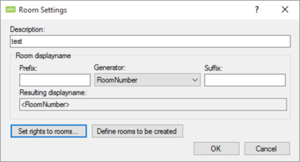
Room displayname
“Prefix”
Text that can be added to the start of what is chosen in “Generator”.
“Generator”
Choose what is to define the room.
“Suffix”
Text that can be added to the end of what is chosen in “Generator”.
“Resulting displayname”
Summary of the chosen display name as it will be shown in Office 365.
“Set rights to rooms…”
Sets the rights on rooms when created
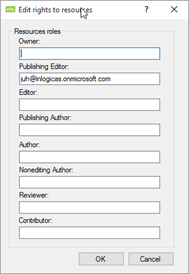
“Owner”
Users will be able to create, read, modify and delete all items and files, and create sub-folders. As the folder owner, they can change the permission levels others have for the folder. (Does not apply to delegates.).
“Publishing Editor”
Users can create, read, modify and delete all items and files, and create sub-folders. (Does not apply to delegates.).
“Editor”
Users can create, read, modify and delete all items and files..
“Publishing Author”
Users can create and read items and files, create sub-folders, and modify and delete items and files they create. (Does not apply to delegates.).
“Author”
Users can create and read items and files and modify and delete items and files you create.
“Nonediting Author”
Users have full read details. Can create items and delete own items. Folder visible.
“Reviewer”
Users can read items and files only.
“Contributor”
Users can create items and files only. The contents of the folder does not appear. (Does not apply to delegates.).
Note With author or editor permissions, a delegate has send-on-behalf-of permission. Sent messages contain both the managers and delegates names. Message recipients see the managers name in the Sent On Behalf Of box and the delegates name in the From box.
“Define rooms to be created”
Specify the rooms to be created based on a filter. If nothing is entered, every room will be created.
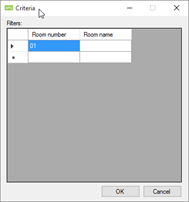
“Room number” and “Room name”
Can be found in the skemabrikker_rooms table in SQL.
“Usage location”
Choose which country that the users are located in.
“Re-License Users”
Pushing this button will cause all the users created with this setting to be relicensed in Office 365.
“License type”
Choose which license type to apply to the users. Remember to check that there is sufficient amount of licenses available.
Office 365 Licenses
Lists of features contained in the chosen license type.
“PowerShell command”
Gives you the commands to connect to the tenant with PowerShell
Office 365 SharePoint site setting
This will create SharePoint sites
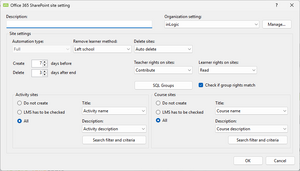
Site settings
“Automation type”
Full: Means that site maintenance will be fully automated.
“Remove learner method”
“Deleted in AD”
Users will be removed from site when they are not active in UMS anymore
“Finished on activity/course”
Users will be removed when they have finished with the course.
“Delete sites”
“Auto delete”
Sites will be delete when the last student has left the site
“Manual Delete”
Sites will not be deleted by UMS. This has to be done by an administrator
“Send mail to teacher(s)”
Send mail notification to teachers when they are attached to a site.
“Create x days before”
Choose how many days before start that the sites are to be created.
“Delete x days after end”
Choose how many days after end that the sites are to be deleted.
“Teacher rights on sites”
Rights the teacher will have on the site when attached.
“Learner rights on sites”
Rights the student/learner will have on the site when attached.
“Check if group rights match”
When UMS looks for UMS-groups on the site, it will do so based on two criteria’s.
The correct rights and the correct name. Unchecking this will disable the first criteria and only look for a group with the right name. (This is when users change the UMS-group rights on a site manually)
“SQL Groups”
Members of these groups will be attached to all sites created with this setting as teachers
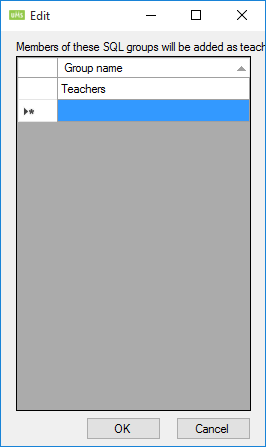
“Group name”
This can only be a group that is found in UMS
You get a list of these groups by running this SQL command:
Select Distinct Aktivitet As Activity From Students Order By Activity
“Activity Sites”
“Do not create”
It will not create any sites based on activities.
“LMS has to be checked”
The field Aktivitet_LMS in the students table has to be “True”. (Look in the documentation for the specific administrative system to see how this is set)
“Based on template filter”
Create sites based on a filter that is specified per template.
“All”
Create all sites.
Title
Title of the site. Changing this after a site has been created will cause it to be updated.
Description
Description of the site. Changing this after a site has been created will cause it to be updated.
Search filter and criteria
This will enable you to concatenate sites that would have been created as to or more sites to be created as one site.
“Remarks”
This is just for description purposes.
“Filter”
The SQL like filter (regular expression). If an activity matches, it will be subject to the settings below in semester roll
“Semester roll”
“Use replace string with empty”
This will replace a section of the site with an empty string.
“Start index”
Determine where to start in string to remove.
“Length”
How many characters will be removed from the string.
“Add activity short description to node ID“
This will add the field Kort_Betegnelse (Short Description) from the students table to the node id.
Node id is the URL.
Examples
If you have three activities named English1, English2, English3 and you only want one SharePoint site.
Set the settings as shown below
This filter ensures that it is only applied to activities that matches this SQL sentence.
“Course Sites”
Course URL’s will always be created as “activity_course”.
“Do not create”
It will not create any sites based on courses.
“LMS has to be checked”
The field Skolefag_LMS in the students table has to be “True”. (Look in the documentation for the specific administrative system to see how this is set)
“Based on template filter”
Create sites based on a filter that is specified per template.
“All”
Create all sites.
Title
Title of the site. Changing this after a site has been created will cause it to be updated.
Description
Description of the site. Changing this after a site has been created will cause it to be updated.
Search filter and criteria
This will enable you to concatenate sites that would have been created as two or more sites to be created as one site.
“Remarks”
This is just for description purposes.
“Course Filter”
The SQL like filter (regular expression). If an activity matches, it will be subject to the settings below in semester roll.
“Semester roll”
“Use replace string with empty”
This will replace a section of the site with an empty string.
“Start index”
Determine where to start in string to remove.
“Length”
How many characters will be removed from the string.
“Activity Filter”
The SQL like filter (regular expression). If an activity matches, it will be subject to the settings below in semester roll
“Semester roll”
“Use replace string with empty”
This will replace a section of the site with an empty string.
“Start index”
Determine where to start in string to remove.
“Length”
How many characters will be removed from the string.
After you have created the Office 365 setting you put in on a template.
Setting: This will created the users with on this template in Office 365 with these settings
SharePoint settings: Sites created with setting. If this is not specified no activities/courses on this template will be created.
Site URL: Which site collection is used when creating sites
Language: The default language of the created site
Course Template
Standard SharePoint: Use a standard template from SharePoint
Course template: Enter a name of a template that resides in the site collection. If nothing is entered it will default to the Team site template
UMS SharePoint Portal: Create sites based on the UMS SharePoint Portal product
OneNote Class Notebook setting
Choose a Class Notebook setting. This will create a Class Notebook created in the SharePoint site.
SQL Groups
Members of these groups will be attached to all sites created with this setting as teachers
“Group name”
This can only be a group that is found in UMS
You get a list of these groups by running this SQL command:
Select Distinct Aktivitet As Activity From Students Order By Activity
OneNote Class Notebook setting
Define settings for OneNote Class Notebooks.
Sections
Define the section the Class Notebook will be created with. Students that are attached to this Class Notebook will have these sections.
OneNote Class Notebook setting
Notebook settings
“Automation type”
Full: Means that Notebooks maintenance will be fully automated.
“Remove learner method”
“Deleted in AD”
Users will be removed from Notebooks when they are not active in UMS anymore
“Finished on activity/course”
Users will be removed when they have finished with the course.
“Delete Notebooks”
“Auto delete”
Notebooks will be delete when the last student has left the Notebook
“Manual Delete”
Notebooks will not be deleted by UMS. This has to be done by an administrator
“Send mail to teacher(s)”
Send mail notification to teachers when they are attached to a Notebook.
“Create x days before”
Choose how many days before start that the Notebooks are to be created.
“Delete x days after end”
Choose how many days after end that the Notebooks are to be deleted.
“SQL Groups”
Members of these groups will be attached to all Notebooks created with this setting as teachers
“Group name”
This can only be a group that is found in UMS
You get a list of these groups by running this SQL command:
Select Distinct Aktivitet As Activity From Students Order By Activity
“Activity Notebooks”
“Do not create”
It will not create any Notebooks based on activities.
“LMS has to be checked”
The field Aktivitet_LMS in the students table has to be “True”. (Look in the documentation for the specific administrative system to see how this is set)
“Based on template filter”
Create Notebooks based on a filter that is specified per template.
“All”
Create all Notebooks.
Title
Title of the Notebook. Changing this after a Notebook has been created will cause it to be updated.
Search filter and criteria
This will enable you to concatenate Notebooks that would have been created as to or more Notebooks to be created as one Notebook.
“Remarks”
This is just for description purposes.
“Filter”
The SQL like filter (regular expression). If an activity matches, it will be subject to the settings below in semester roll
“Semester roll”
“Use replace string with empty”
This will replace a section of the Notebook with an empty string.
“Start index”
Determine where to start in string to remove.
“Length”
How many characters will be removed from the string.
“Add activity short description to node ID“
This will add the field Kort_Betegnelse (Short Description) from the students table to the node id.
Node id is the URL.
Examples
If you have three activities named English1, English2, English3 and you only want one Notebook.
Set the settings as shown below
This filter ensures that it is only applied to activities that matches this SQL sentence.
“Course Notebooks”
Course URL’s will always be created as “activity course”.
“Do not create”
It will not create any Notebooks based on courses.
“LMS has to be checked”
The field Skolefag_LMS in the students table has to be “True”. (Look in the documentation for the specific administrative system to see how this is set)
“Based on template filter”
Create Notebook based on a filter that is specified per template.
“All”
Create all Notebooks.
Title
Title of the Notebook. Changing this after a Notebook has been created will cause it to be updated.
Search filter and criteria
This will enable you to concatenate Notebooks that would have been created as two or more Notebooks to be created as one Notebook.
“Remarks”
This is just for description purposes.
“Course Filter”
The SQL like filter (regular expression). If an activity matches, it will be subject to the settings below in semester roll.
“Semester roll”
“Use replace string with empty”
This will replace a section of the Notebook with an empty string.
“Start index”
Determine where to start in string to remove.
“Length”
How many characters will be removed from the string.
“Activity Filter”
The SQL like filter (regular expression). If an activity matches, it will be subject to the settings below in semester roll
“Semester roll”
“Use replace string with empty”
This will replace a section of the Notebook with an empty string.
“Start index”
Determine where to start in string to remove.
“Length”
How many characters will be removed from the string.
After you have created the Office 365 setting you put in on a template.
Setting: This will created the users with on this template in Office 365 with these settings
OneNote Class Notebook settings: Notebooks created with setting. If this is not specified no activities/courses on this template will be created.
Site collection URL: Which Notebook collection is used when creating Notebooks
Language: The default language of the created Notebook
Sections
Define the section the Class Notebook will be created with. Students that are attached to this Class Notebook will have these sections.
SQL Groups
Members of these groups will be attached to all Notebooks created with this setting as teachers
“Group name”
This can only be a group that is found in UMS
You get a list of these groups by running this SQL command:
Select Distinct Aktivitet As Activity From Students Order By Activity
Organization Settings
Site settings
“Description”
Add a description to be able to identify the account.
“SharePoint administration URL”
URL of the SharePoint administration site for the tenant.
Credentials settings
“Username”
Username used to connect to SharePoint.
“Password”
Password used to connect to SharePoint.